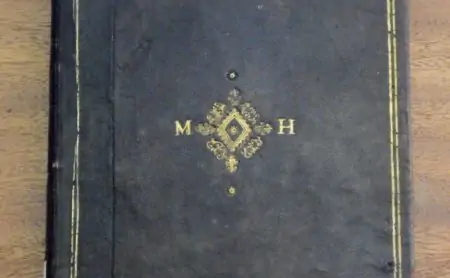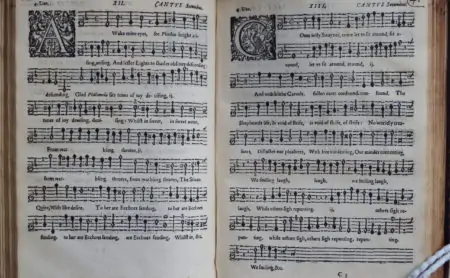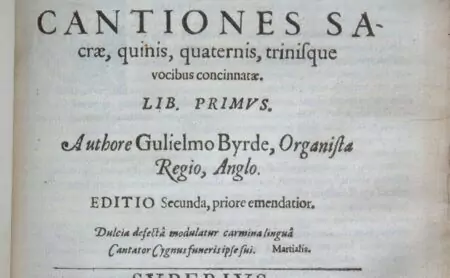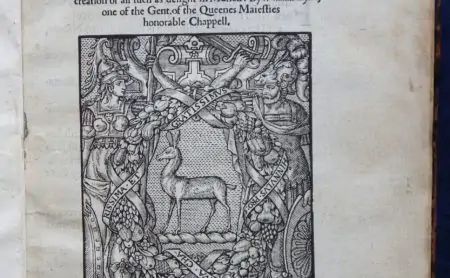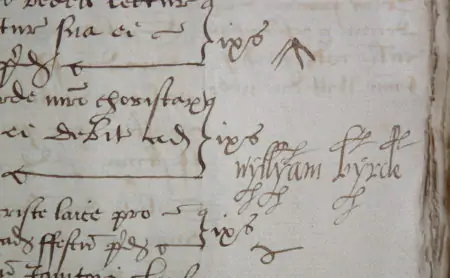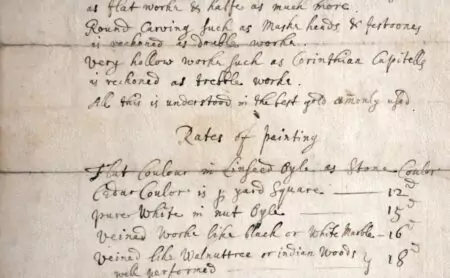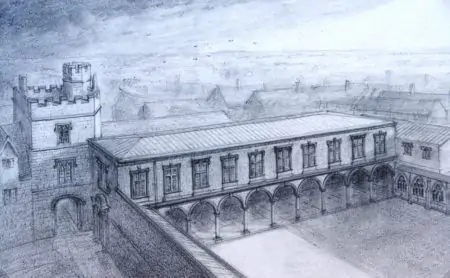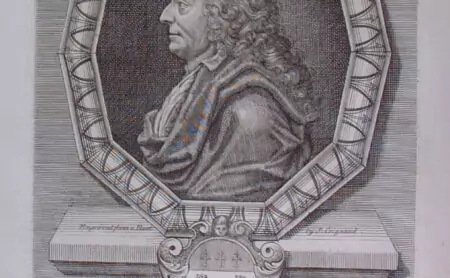Julie Taylor, our librarian picks out some of her favourite books, manuscripts and artefacts from the Cathedral library collection to share
William Byrd
In 2023 at Lincoln Cathedral we celebrated the life and works of English composer, William Byrd (1543-1623) with a five day festival of lectures and recitals.
Byrd was known for both sacred and non-religious music. Between 1563 and 1572 he was organist and master of the choristers at Lincoln Cathedral. A blue plaque on one of the houses in Minster Yard marks where Byrd’s house would have stood. He became the organist at Lincoln at the very young age of 20. In addition to a generous salary of £13 6s 8d he received a yearly payment of 9s for livery (clothing). He left Lincoln in 1572 to take up a post in the Chapel Royal, the private chapel of Queen Elizabeth 1. In 1575 along with the composer Thomas Tallis, he was awarded a patent for printing music.
The library has five printed Byrd part books which include “Psalmes, Sonets & Songs of Sadnes and Piete” (1588), “Cantiones Sacrae” (1589-91) and “Gradualia” (1610).
These originally belonged to Michael Honywood, 1st Dean of Lincoln at the restoration of the monarchy in 1660. It was his generosity that paid for the building of the Wren library to house his collection of approximately 3,800 books. The Byrd part books are the only books in the library to have Honywood’s own personalised bindings.
Byrd’s rather flamboyant signature can be seen in the Chapter records.
Sir Christopher Wren (1632-1723)
2023 marked 300 years since the death of Sir Christopher Wren, architect, mathematician, scientist and astronomer. He is perhaps best remembered as an architect and for designing 53 London churches, including St Pauls, following their destruction during the Great Fire of London in 1666. He was a founder member of the Royal Society and was knighted in 1673.
Lincoln Cathedral’s connection with Wren is that in 1674 Dean Michael Honywood, first Dean at the Restoration of the Monarchy in 1660, commissioned Wren to design a library for him in which he could house his collection of almost 3,800 books. This was to be the first major new building project to be undertaken in the Cathedral for over 200 years. Honywood was probably introduced to Wren by an old Cambridge friend, William Sancroft, who had lodged with him for a time in Utrecht while both were in exile during the English Civil War. In 1664 Sancroft was appointed Dean of St Paul’s in London and as such was later to work with Wren after the Great Fire. Wren was also working for Sancroft at Emmanuel College Cambridge where the latter was Master.
No evidence exists to show that Wren actually visited Lincoln, but in the Cathedral archives is a document signed by him in which the rates of payment for the different craftsmen who were to decorate the library according to his specifications are itemised. As the finishing touches to the library, these would have been the final jobs to be completed, suggesting that Wren was involved throughout the process even if he never physically came to the city. The signature is at the foot of the document, although it is very faint.
A local builder, William Evison, was employed to undertake the actual building of the library which was completed in 1676, just 2 years after it was started. The resulting library was later described by art historian Sir Roy Strong during a visit to the Cathedral as “the most beautiful room in England”. It is one of only 3 surviving Wren libraries, the others being at St Paul’s Cathedral and Trinity College Cambridge. The following artist’s impression shows what the cloister would originally have looked like when the Wren library was built, with the tower to the medieval deanery still in place. (artist: David Vale)
The Library has a copy of “Parentalia: or, memoirs of the family of Wrens . . chiefly Sir Christopher Wren . .” compiled by his son Christopher. It was printed in London in 1750 by his grandson Stephen Wren and contains this magnificent portrait of Wren himself.
The Wren library is currently closed for major repair work so we are unable to properly commemorate the anniversary of Wren’s death but hope to be able to celebrate the anniversary of the library itself once we re-open. We are looking forward to being able to welcome visitors once more into our beautiful Wren Library.
